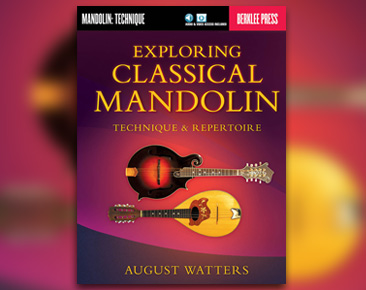But there he is, living in nearby Brookline and teaching ear training at Berklee, where students of most any instrument (including mandolin) can cultivate the techniques and theory of modern popular music.
August has written a new book for mandolinists, published by Berklee Press, which is designed to introduce the study of classical mandolin to today’s players. As the popularity of the instrument has increased in recent years, mandolinists have explored not only bluegrass and old time music, but also other forms where the mandolin is common, like Brazilian dance music and classical music.
Exploring Classical Mandolin is meant to remedy the dearth of published materials for approaching the style, something August has worked intensely on recently. This is the sort of music performed by mandolin orchestras in the instrument’s previous hey day in the early 20th century.
He says that he has pored over vintage instructional manuals for hints on how to best present it to modern players.
“I’ve spent a lot of time over the past years studying the old method books. There are techniques in those books that hardly anyone uses today, so I decided to write a book to introduce these rich traditions to a broader audience. Berklee Press wanted to emphasize original music, so I wrote new contemporary etudes using the old techniques. Now you can practice these techniques by playing musical pieces designed with a technical goal in mind, which is more rewarding than just practicing exercises. For example, most bluegrass players use a pattern of eight notes for crosspicking rhythms such as DUUDUUDU. There are specific patterns like that, with from 3 to 12 notes, in the literature. The 18th century methods Leone and Denis both have delightful music based on those patterns.”
Watters explained how he went from a jazz hound, to a grasser, and then to a classical mandolinist.
“I started playing in the ’70s, but was mainly a jazz guitarist then. I got hot into bluegrass in 1979, when I discovered Darol Anger and David Grisman. I moved to San Francisco in the 1980s to be around the acoustic music scene, but ended up studying at Berklee after that. I got into mandolin in the last 15 years or so, and have always been a multi-stylist. My interest in the roots of the American mandolin brought me to Italian folk and classical mandolin music, until finally I had to have an Italian bowl-back mandolin. The big surprise has been that it’s also great for other styles I play: New England contra dance music, choro, and swing.
I still have my F5 and A4 mandolins, and use them sometimes — for example, some of this Golden Era early American mandolin music sounds perfect on the archtop mandolin, since after all that’s the instrument it was written for! Orville Gibson made his first carved-top mandolins in the 1890s, a good 40 years before Bill Monroe discovered his F5 hanging in a barber shop. It’s easy now to forget that the F5 mandolin was designed for classical and other popular music, since now that instrument is so closely identified with Bill Monroe and the music that came after him.”
In addition to August’s own compositions, the book includes arrangements of music from Bach, Telemann, Beethoven, Puccini, Foster, Dvořák and pieces written for mandolin by Fouchetti, Barbella, Denis, Beethoven, Mozart, and Nakano.
It runs to 170 pages in a 9 x 12” format. Exploring Classical Mandolin is offered through a number of music retailers and popular bookstores online.
